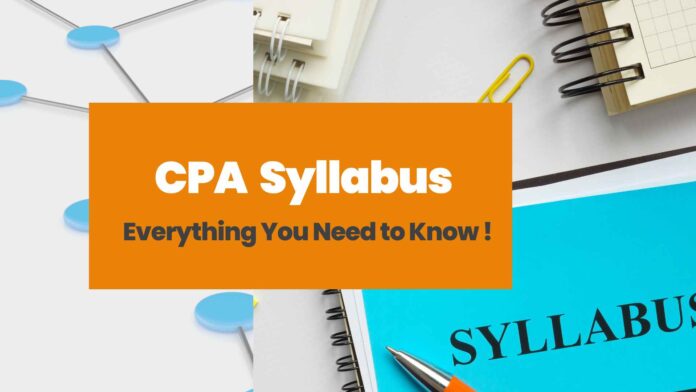Overview
The CPA syllabus is an important document that outlines the topics to be covered in order to obtain your CPA certification. It contains a comprehensive list of all topics, subtopics, and courses associated with the CPA program. The CPA syllabus is organized into three main categories: Accounting Theory and Practices, Financial Analysis and Performance Management, and Business Law and Ethics.
Accounting Theory & Practices focuses on the fundamentals of accounting including the Generally Accepted Accounting Principles (GAAP), financial statement analysis, auditing standards, tax rules and regulations, and more. This section also addresses the ethical obligations of accountants and how to apply accounting principles to various business decisions recording regarding CPA Syllabus.
Financial Analysis & Performance Management is an important part of the CPA syllabus which covers a variety of core concepts such as internal controls, budgeting processes, financial statement analysis, data mining techniques, performance management frameworks and more. This area helps prepare you for careers in finance or accounting consulting.
Business Law & Ethics addresses business regulations at both the federal and state levels. It also covers legal concepts such as contracts, negligence rules, bankruptcy laws, securities law issues, labour law regulations and more. By understanding these topics you will be able to better manage legal risks in business decision-making processes.
The CPA syllabus provides a framework for students to obtain their certification in a timely manner while also gaining valuable knowledge that can be applied across various professional fields. With its comprehensive coverage of all relevant topics related to CPA preparation, you will have the necessary tools to pass your exams at the highest level possible. Following are some of the most important parts of the CPA syllabus.
Financial Accounting and Reporting
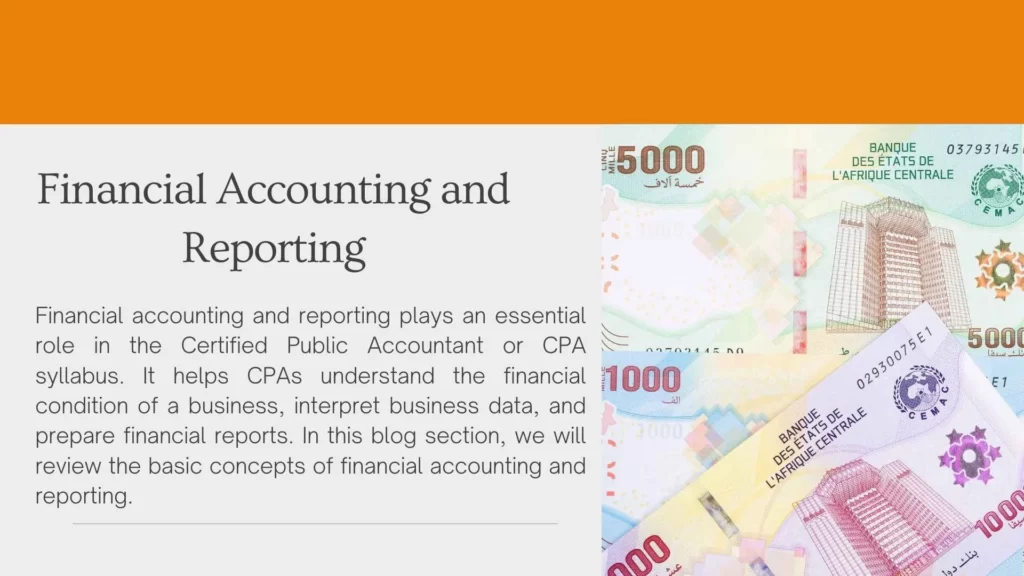
Financial accounting and reporting play an essential role in the Certified Public Accountant or CPA syllabus. It helps CPAs understand the financial condition of a business, interpret business data, and prepare financial reports. In this blog section, we will review the basic concepts of financial accounting and reporting.
Financial statements provide insight into the CPA syllabus into the financial condition of a company. Financial statements generally include an income statement, a balance sheet, a cash flow statement, and a statement of changes in equity. The main purpose of these documents is to provide a snapshot view of where money is coming from and where it’s going at any given time.
GAAP (generally accepted accounting principles) and IFRS (International Financial Reporting Standards) are two major frameworks used to prepare financial statements. Both frameworks help to ensure uniformity among different companies’ financial statements by providing guidelines for how certain accounts should be reported on a balance sheet or income statement.
Recordkeeping is fundamental to financial accounting and reporting as it forms the basis for understanding how much a business has spent or earned over a period of time. Business transactions must be recorded in accordance with GAAP or IFRS requirements in order to produce useful financial statements that can be used to monitor performance against goals, detect fraud, analyze operational costs, etc.
Disclosure requirements are also important aspects of financial accounting and reporting as they provide shareholders with sufficient information about the company’s operations that they can make informed decisions about investing in it. Companies must include specific information about their operations—such as assets & liabilities analysis—on their annual reports so investors can assess risks associated with investing in them.
Assets & liabilities analysis is an integral part of preparing your financial statements. This involves determining how assets and liabilities should be valued and how each one affects your overall financial position. To do this, you will recognize, measure, and classify accounts based on their balance sheet category.
Business transaction recording is important for accurately capturing all data associated with a transaction that occurs within an organization’s system. This includes debits and credits as well as revenues and expenses, which are typically recorded in the general ledger.
Reporting both internally and externally is required in order to ensure compliance with state law, generally accepted accounting principles (GAAP), or the International Financial Reporting Standards (IFRS). Internal reporting is often used by management to analyze trends and forecast performance while external reporting is used to communicate information to stakeholders like investors or creditors.
Preparing financial reports involves compiling data from various sources in order to construct statements that are useful for decision-making. This may include income statements, balance sheets, cash flow statements, notes to the financials, or formal letters of representation from management. The objective of these reports is usually to give stakeholders a clear picture of the company’s performance so they can make informed decisions about investing in it or lending it money.
The Conceptual Framework, Financial Reporting, and Standard Setting section of the CPA syllabus deals with understanding how the conceptual framework helps in developing GAAP and IFRS standards for financial reporting purposes.
When it comes to selecting financial statement accounts, it’s important that you take into account the types of transactions being recorded. Different types of transactions should be recorded in different accounts to ensure accuracy. For example, cash transactions should be recorded in a cash account as opposed to a sales account.
It’s also important that you ensure your balance sheets are accurate and all accounts balance at the end of the statement period. Once you’ve selected your financial statement accounts, it’s important to understand how to select transactions properly when recording them in your financial books. Knowing how to select specific details such as date, amount, customer information, etc., will help you keep track of all expenses and revenue streams accurately.
Finally, when it comes to state and local governments there are different rules when it comes to reporting financial statements due to their unique organizational structures. It’s important that you understand all the different governmental regulations for these entities when filing their statements so that they comply with all federal laws pertaining to taxation and other relevant matters.
Financial accounting and reporting are an integral part of any CPA syllabus, so understanding these key concepts is essential for success on the exam. With a good understanding of the topics discussed here, you’ll be more than prepared for what the exam may throw at you!
Have a look at the best Investment Banking courses
Auditing and Attestation
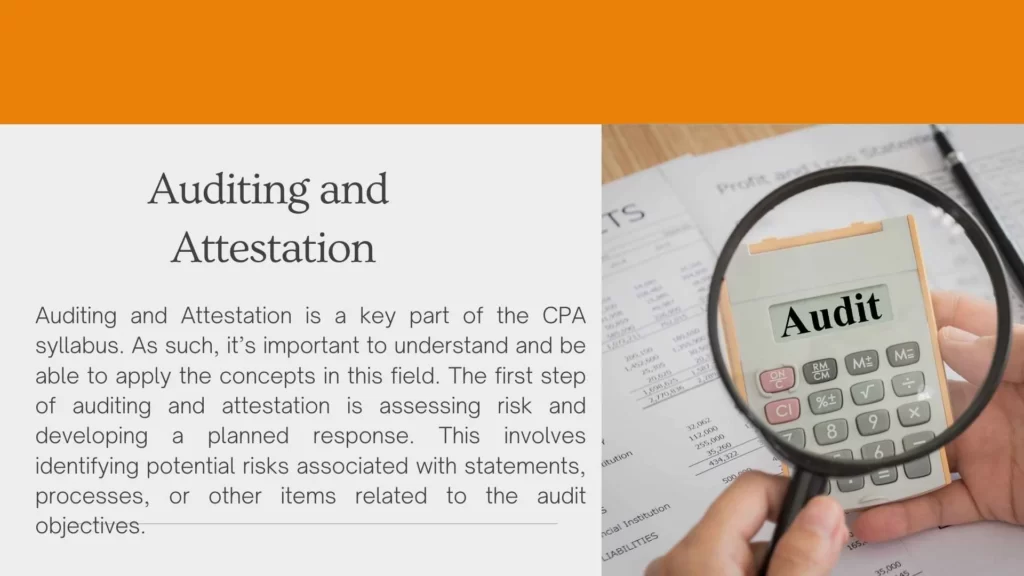
Auditing and Attestation is a key parts of the CPA syllabus. As such, it’s important to understand and be able to apply the concepts in this field. The first step of auditing and attestation is assessing risk and developing a planned response.
This involves identifying potential risks associated with statements, processes, or other items related to the audit objectives. Once these risks have been identified, an appropriate response plan must be created to address them. Understanding the concepts of auditing & attestation is a fundamental part of the CPA syllabus.
Auditing is a formal process that looks at the financial statements or documents of an organization or individual to ensure the accuracy of information. It involves gathering facts, analyzing data and forming conclusions based on those facts and data. Attestation involves expressing a formal opinion regarding the financial records of an entity or person based on that audit.
One of the key CPA syllabus of auditing & attestation is establishing a quality control framework. This framework sets out procedures for conducting audits as well as expectations for ethical behaviour and professional standards.
It also outlines processes for auditors to follow when assessing risk, obtaining evidence and forming conclusions about their findings. The quality control framework also includes requirements for third parties to report noncompliance with this framework. This helps ensure transparency and accuracy in the auditor’s work.
As part of their professional responsibilities, all auditors must adhere to certain ethical principles such as integrity, objectivity, professional competence and due care while performing audits and attestations. They must also make sure they have adequate knowledge of relevant laws and regulations that may affect their work in order to form reliable conclusions about their findings.
The next step of auditing and attestation is obtaining evidence and performing further procedures. This involves collecting relevant evidence to assess the validity of any assertions made by management and develop conclusions about their accuracy. Depending on the nature of the evaluation, additional procedures may need to be performed as part of this process such as analyzing internal controls or observing operations.
Finally, after all, documents have been collected and procedures performed, it’s time to report results and form conclusions about their accuracy. In this stage, you’ll be looking for any material misstatements that could potentially impact financial statements or other assertions that are being evaluated during the audit. It’s important at this stage to consider not just quantitative details but also qualitative aspects when forming your conclusions.
Auditing and Attestation require a thorough understanding of the concepts involved in order to properly analyze information obtained during an evaluation process. By understanding how to assess risk and obtain evidence while continuously testing assumptions when forming conclusions, you will be well on your way toward mastering these skills as part of your CPA syllabus preparation!
Know all about the best PG Program In Financial Modelling
Regulations
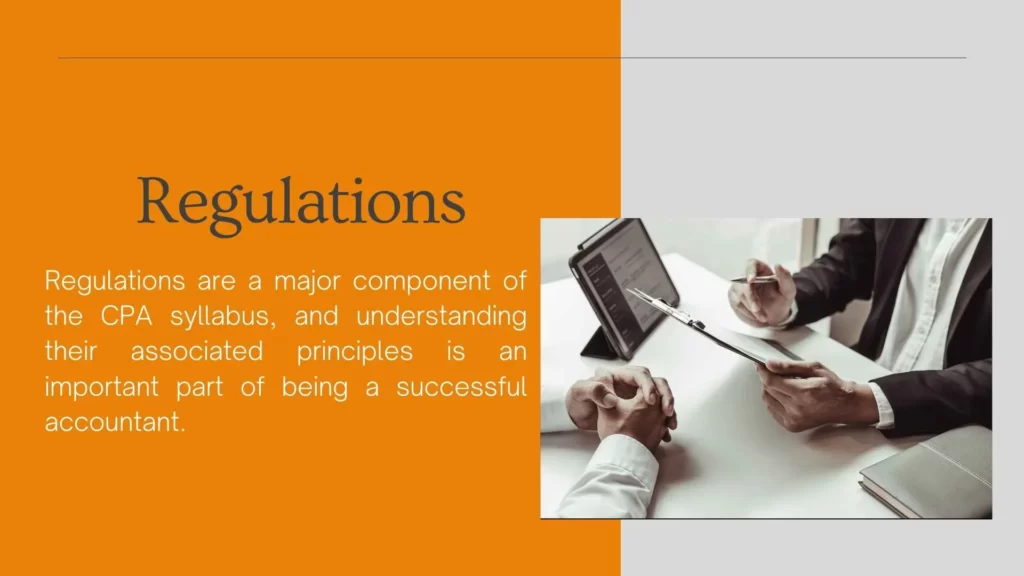
Regulations are a major component of the CPA syllabus, and understanding their associated principles is an important part of being a successful accountant. This part will discuss some of the regulations included in the CPA syllabus and discuss how they affect the daily responsibilities of a professional accountant.
First up are Federal Tax Procedures, Professional Responsibilities and Ethics – these topics form the basis of what every accountant must know to protect their client’s interests as well as their own. It is important to understand federal tax regulations and laws that protect both taxpayers and accountants from fraudulent activities along with relevant statutes, cases, and IRS publications.
In addition,CPA Syllabus includes learning proper professional responsibilities such as satisfying ethics requirements in accordance with generally accepted accounting principles (GAAP) enables one to be a responsible, trustworthy accountant.
Next, we explore Business Law which encompasses many legal aspects from debt disputes to intellectual property protection in CPA Syllabus. Knowing business law helps an accountant manage risk factors for their clients as well as manage fees related to court cases or alternative dispute resolution proceedings. Furthermore, this topic also helps accountants evaluate contracts before agreeing to terms that could adversely affect either party’s financial interests.
Thirdly, there is the Federal Taxation of Property Transactions which looks at how real estate transactions are taxed on both federal and state levels. This portion of the CPA syllabus covers topics such as capital gains taxes and depreciation expenses which are important concepts when engaging in real estate deals or when constructing legitimate expense reports in order to reduce taxes owed.
When it comes to federal taxation of individuals, the CPA syllabus includes topics like understanding the marginal tax rate system and deductions. You will also learn about filing status options and how to calculate capital gains tax and other forms of income. Understanding each of these CPA Syllabus concepts is essential so that you can help your clients properly file their taxes during tax season.
The CPA syllabus also covers the taxation of entities. As a CPA, you need to understand the differences between corporations, partnerships, SCorps and LLCs – as well as the different tax liabilities associated with each entity type.
You must also understand which taxes need to be paid on different types of income, including dividends, royalties, rent and compensation from shareholders or employees. With this knowledge in hand, you can provide accurate and up-to-date advice for your corporate clients about federal taxation requirements for their specific business entity type.
Overall, understanding regulations surrounding federal taxation is an important part of the CPA syllabus that all professionals should take note of if they wish to be successful in this field. Hopefully, this blog has helped shed some light on why a thorough comprehension of taxation rules is essential for any aspiring accountant!
Business Environment and Concepts
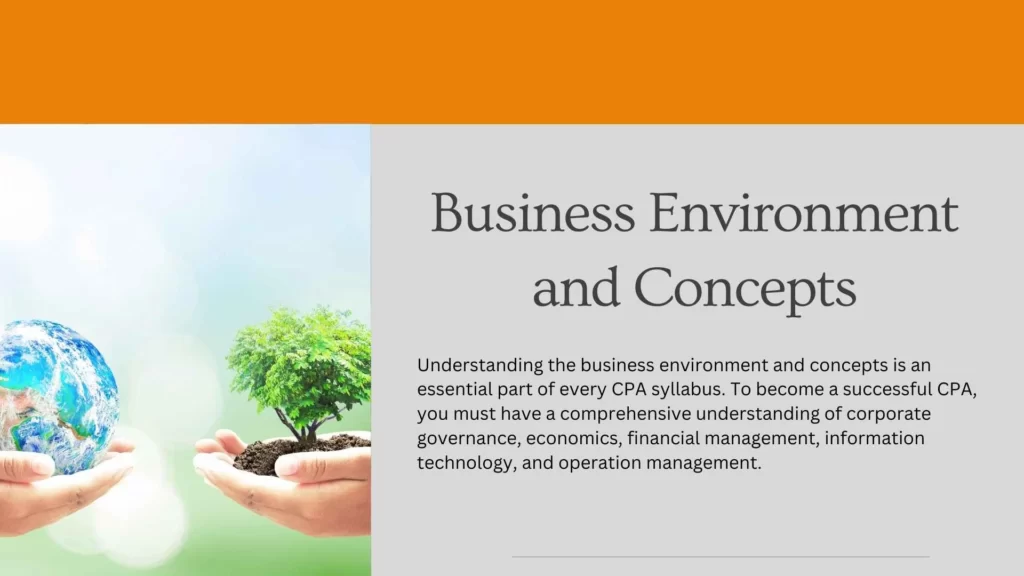
Understanding the business environment and concepts is an essential part of every CPA syllabus. To become a successful CPA, you must have a comprehensive understanding of CPA Syllabus which includes corporate governance, economics, financial management, information technology, and operation management. In this blog post, we will explore these key concepts in more detail.
Let’s start with corporate governance. This covers the ways in which organizations are managed and the set of rules that guide their decision-making process and operations. Corporate governance is important as it ensures that organizations are run ethically and effectively. It also ensures that there is a balance of power between boards and managers to protect shareholders’ interests.
Next is economics which examines how resources are allocated and how decisions are made about what to produce, how to produce it, who benefits from production, and how much should be produced. Economics helps CPAs understand the macroeconomic climate so they can make better decisions when providing business advice to their clients.
Financial management goes hand in hand with economics by looking at the day-to-day financial operations of an organization such as budgeting, forecasting, long-term planning, cash flow management, and more. To be successful in financial management, CPAs need to have a firm understanding of taxation laws as well as the ability to analyze financial statements.
Information technology plays an increasingly important role in modern businesses and CPAs should have a good understanding of IT systems and software solutions available on the market today. This includes cloud computing applications such as Salesforce, Enterprise Resource Planning (ERP) systems like SAP or Oracle Financials plus popular accounting platforms like QuickBooks or Xero.
Under the operation management section of the CPA syllabus, you will learn how to analyze an organization’s current strategies, assess how they are impacting performance, and make appropriate recommendations. Additionally, you will learn how to apply quantitative tools such as forecasting, process analysis and improvement techniques such as Lean Six Sigma in order to improve operational effectiveness.
You will gain further insight into supply chain issues such as inventory planning, scheduling for maximum efficiency, the balance of stock/inventory levels, logistics planning, pricing analysis and customer service approaches. You will also develop an understanding of the effects that technology has had on improving operations over time.
By studying operation management through the CPA syllabus you will be well prepared to successfully manage resources within an organization as well as help it stay competitive in today’s ever-changing business environment. With these skills, you can find opportunities that create additional value for your organization’s customers while also helping keep costs low and competitive. Ultimately this section of the CPA syllabus equips you with the necessary knowledge for effective operation management so that businesses can maximize their potential for success.
Visit the top PG Program In Investment Banking program with a placement guarantee
Professional Ethics
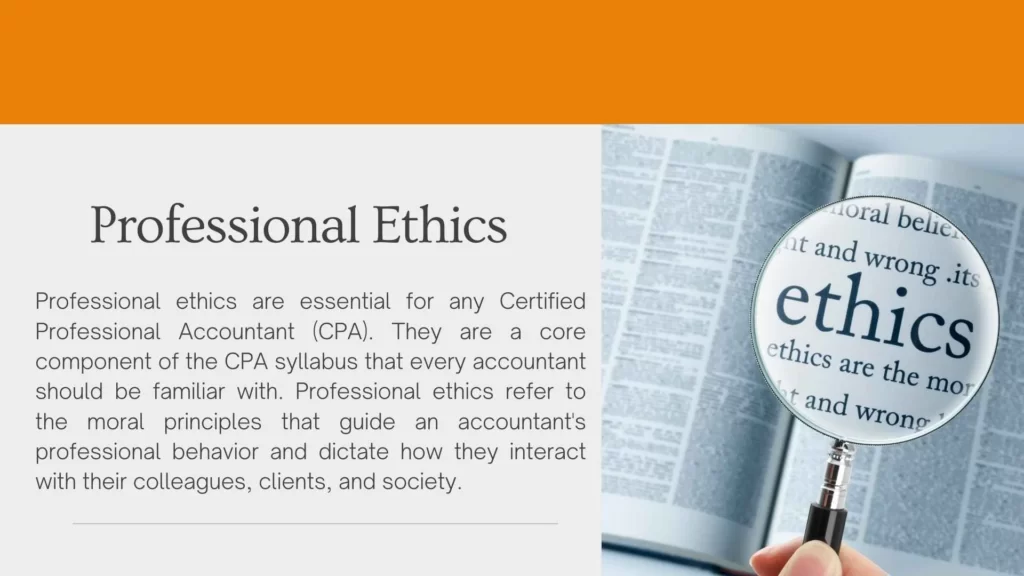
Professional ethics are essential for any Certified Professional Accountant (CPA). They are a core component of the CPA syllabus that every accountant should be familiar with. Professional ethics refers to the moral principles that guide accountants’ professional behaviour and dictate how they interact with their colleagues, clients, and society. This includes a variety of topics, such as social responsibility, ethical conduct, conflict of interest, professional standards, and making moral decisions.
Understanding these concepts is crucial for any CPA as they will have to make decisions based on these principles during their professional careers. To that end, it is important to know what each concept entails so you can make informed and responsible decisions.
Social responsibility is one example of a key professional ethics concept. It involves taking responsibility for the consequences of your actions by understanding the potential impacts on society before making decisions. This means an accountant must consider any negative outcomes or potential harms such decisions may have on the public when formulating business practices or recommending solutions to clients.
Ethical behaviour is another essential topic within professional ethics that must be adhered to by accountants. This involves acting responsibly and in accordance with established ethical norms when dealing with clients or colleagues. For example, this could mean not taking advantage of another person’s ignorance or providing false or misleading information in order to achieve personal gain.
One important concept related to professional ethics is a conflict of interest. A conflict of interest occurs when personal interests or gain stands in opposition to a duty or responsibility of a professional role. To ensure that conflicts do not arise, it is important that accountants maintain strict standards when handling sensitive information and be forthcoming about their affiliations with clients or other parties concerned in their work.
Professional standards also form an integral part of any CPA syllabus. These standards include maintaining confidentiality, avoiding unethical behaviour, adhering to proper due diligence while working on cases, and avoiding unethical practices such as manipulating financial data or making false statements. In addition, professionals must always ensure that they are abiding by relevant laws and regulations in order to comply with ethical expectations.
Finally, accountants should use moral decision-making when faced with challenges in their work. Moral decisions involve taking into consideration not only the immediate consequences but also potential long-term repercussions for oneself, one’s client, or society as a whole. It is important to understand one’s own values and how those values may impact one’s decisions in order to make ethical choices with certainty.
Conclusion
As a CPA candidate, understanding the different areas of the CPA syllabus is key to passing your exam. Each section of the syllabus contains its own set of specific topics and expectations that you must be familiar with in order to pass the exam.
To prepare for your CPA Exam, it is important to become familiar with each area of the CPA syllabus. Start by reviewing all of the topics in each section and make sure that you understand them thoroughly. Practice questions can be helpful for understanding concepts better and gaining an understanding of what will be expected on test day. Additionally, attending study groups or taking prep courses are excellent strategies as well for the preparation for the CPA syllabus.
In terms of taking the actual exam, there are a few important things to consider when studying for each section. First, there are multiple choice questions as well as simulations, which puts into practice what you have learned from studying the syllabus.
Secondly, time management plays a huge role in passing each portion; make sure that you plan your time according to how much material you need to cover in order to get through all topics before running out of time. Lastly, it’s crucial that you stay focused during each part of the exam so that you can retain all information during testing periods when distractions increase significantly.
Understanding the different areas of the CPA syllabus is key to passing your exam. Knowing which topics are covered and how they will be tested will help guide your studying efforts and help you achieve success on test day!
Frequently Asked Questions
The CPA syllabus for 2023 includes 4 topics
- Auditing and Attestation
- Financial Accounting & Reporting
- Regulations
- Business Environment Concepts
Yes! It is possible to do well in the CPA exam. All you need is good time management, helpful advice, and a plan for studying and you’ll be well on your way to becoming a certified CPA.
Becoming a CPA or CA requires a lot of hard work and dedication. You can pass the CPA exam in 6-12 months while becoming a CA can take 3-4 years. Even though both exams are difficult, the longer time frame for becoming a CA shows that it is more comprehensive. Therefore, it is not fair to compare the two exams.
Choosing between a CPA (Certified Public Accountant) and a CA (Chartered Accountant) is not easy, as both have successful careers with advantages and disadvantages. A CPA is the best choice if you want to work abroad or for an international company while getting a CA is the right path if you want to open your own auditing business in India.
The CPA syllabus is easier than CS. CPA focuses on accounting for public entities, while CS covers company laws, drafting, and presentation skills. CS is a more comprehensive course.
Most Indian B.Com graduates are eligible to take the CPA exam. Indian university education typically lasts three years, which is equivalent to 90-semester credits in the U.S. If you plan on pursuing a CPA course after completing your Bcom degree, then you can go ahead and do it.
Which is harder: CPA or MBA? The US CPA exams are much harder to pass than the MBA exams, with a lower average passing rate.
Yes, there is a great opportunity for Certified Public Accountants (CPAs) in India. They have expertise in corporate governance and international accounting, so they are often hired by financial services companies.
If you’re looking for a challenging career in finance and accounting, becoming a Certified Public Accountant (CPA) might be the right choice. The CPA designation is administered by the American Institute of Certified Public Accounts (AICPA).
As there is no negative marking, do not leave any questions unanswered. Instead, try to make an educated guess.




